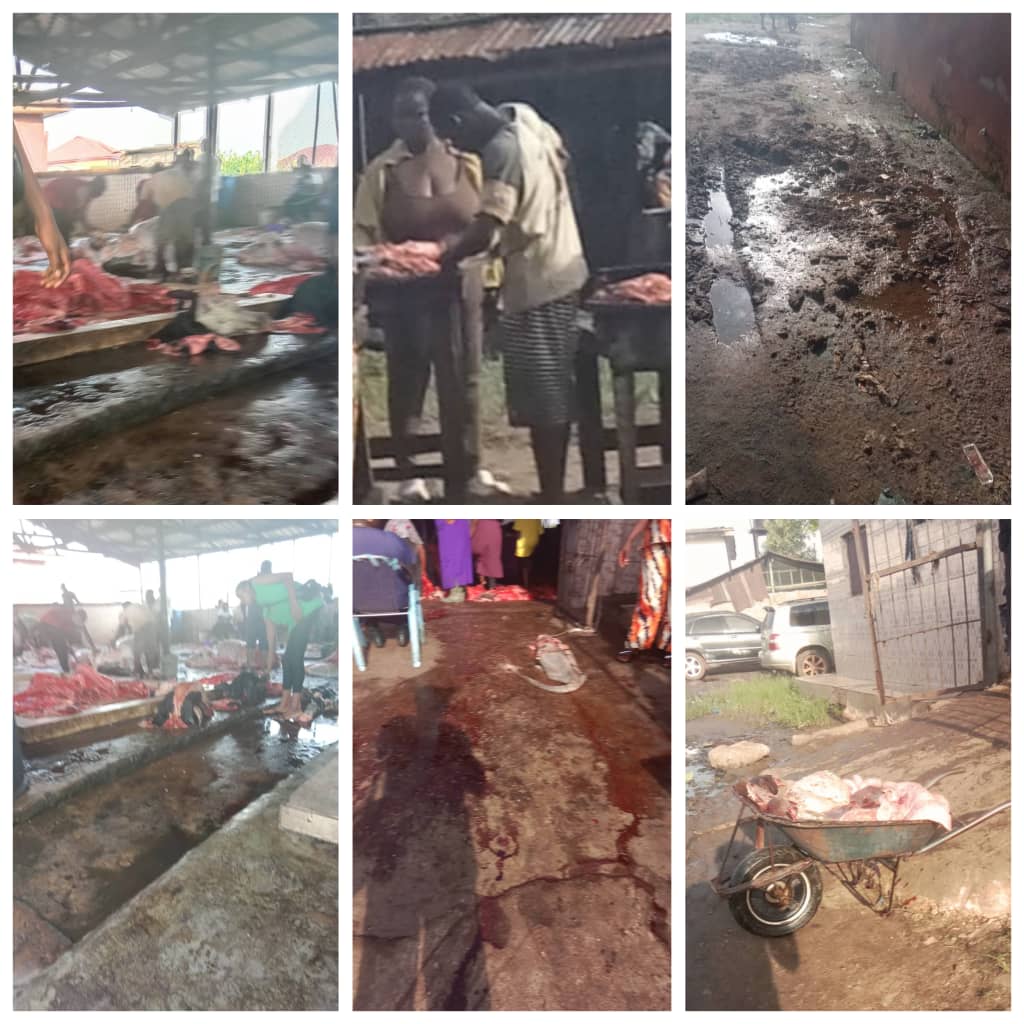By Osehobo Ofure
There are many slaughterhouses, or abattoirs, in Benin City, the Edo State capital, where animals are slaughtered daily for meat meant for public consumption. Some of these abattoirs are owned and operated by local governments, while others are privately managed.
One of the main government abattoirs, located near the swamps of the Ikpoba River, is over 65 years old.
At the abattoir, cows are slaughtered on bare floors, while butchers work without protective gear. With the borehole long out of service, they rely on water from a nearby house to wash animal parts, which often ends up mingling with stagnant pools of blood and dung infested with maggots just a few feet from the slaughter scene.
Waste from the slaughtered animals and their entrails are dumped in heaps nearby, occasionally collected by farmers as manure. The cold room installed decades ago is locked up and remains nonfunctional due to a lack of electricity.
According to Comrade Sunny Omokaro, National President of the National Butchers Employers Union of Nigeria, the abattoir generates about ₦1,000 per slaughtered cow daily for the local government council.
Despite this steady revenue, the facility remains in a state of decay, with the council making no effort to maintain it.
“We have made several representations to the council on this matter without any response beyond empty promises. It is a very pathetic situation,” Omokaro lamented.
READ ALSO: Edo Deputy Gov To Christian Community: Expect Success Stories From Okpebholo’s Administration
Bright Omokaro, a butcher with over three decades of experience, explains the process: “Once the cow is brought in, a Muslim is present alongside a veterinary doctor who inspects and approves the cow for slaughter. The Muslim offers prayers and slaughters the cow, after which the veterinary doctor inspects it again before it is butchered.”
On what happens if an animal is declared sick or pregnant, he said, “If it’s sick, we kill and bury it. We even pour chemicals over it to ensure no one exhumes it to sell to unsuspecting members of the public.”
Kingsley Balogun, Secretary of the Butchers, emphasized the critical role of veterinary doctors.
“Without them, meat cannot be slaughtered or sold for public consumption,” he said.
He recounted an incident where a woman complained about meat swelling in her pot.
“When she told us, we asked where she bought it. She admitted it was from the roadside. We told her we couldn’t help because it wasn’t from us. Meat from licensed abattoirs is 90% safe. People should shun roadside meat and illegal abattoirs.”
An official of the Edo State Ministry of Agriculture, who pleaded anonymity, confirmed that local governments have health inspectors trained to approve animal products from slaughterhouses for public consumption.
READ ALSO: Edo Demolishes House Linked To Kidnapping Gang
Comrade Omokaro, who recently toured slaughterhouses in the South-South geopolitical zone, decried the state of these facilities. “I discovered that, except perhaps in Rivers State where the government intervened, there is nothing to write home about. Nationwide, the state of slaughterhouses is appalling. The environment is unhygienic and unfit for what goes on there. A lot of Nigerians would stop eating meat if they saw these places.”
He also criticized local governments in Edo State for arbitrarily issuing licenses to unqualified individuals to operate abattoirs.
“Butchery is a profession. I was under my uncle’s tutelage for seven years, underwent medical tests, and only then was I issued a butcher’s license. These days, it’s not the case. Local governments must assess facilities before licensing them. In Edo, less than 20% of private abattoirs are fit for purpose.”
Omokaro warned about the acute shortage of veterinary doctors. “By law, every animal must be inspected before and after slaughter. But in Edo State, over 70% of animals are not inspected at all because we have only eight veterinary doctors—four in the field and four in the office. This is dangerous. If there were an epidemic today from meat consumption, it would be impossible to trace its source.”
“In the past, veterinary doctors were stationed at abattoirs, waiting to inspect animals before butchering. Ideally, each abattoir should have a resident veterinary doctor. Government must act fast before it’s too late.”
